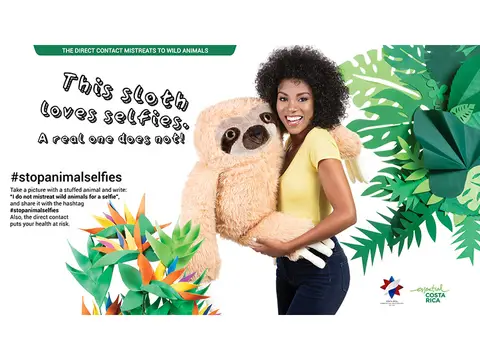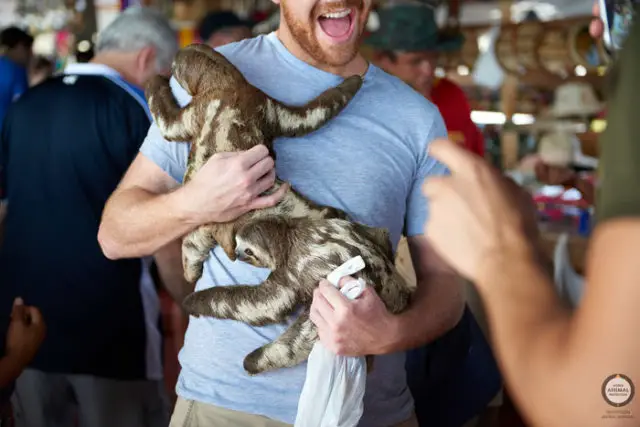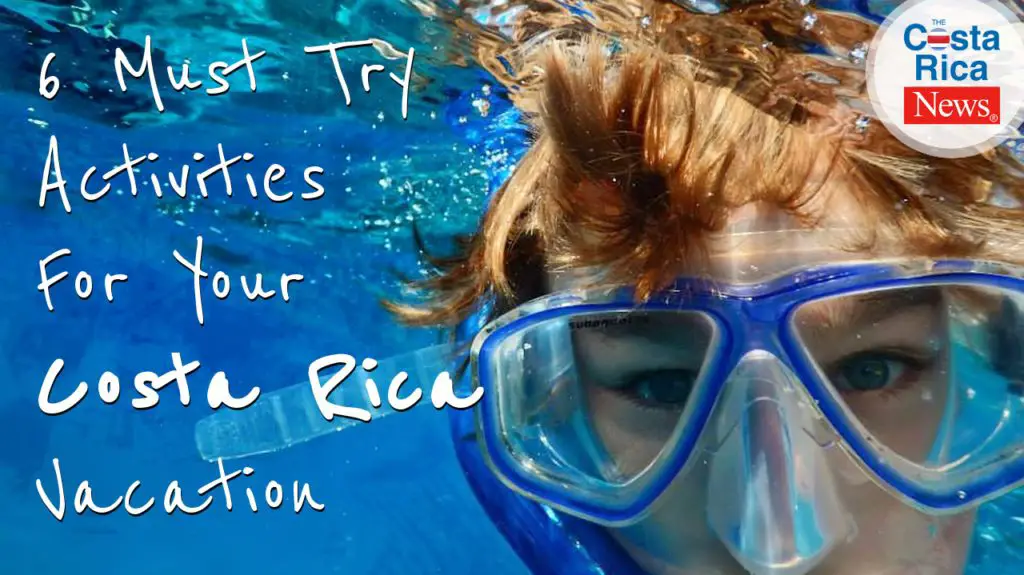Recently it was known that Costa Rica has launched a campaign to protect animals from inappropriate or cruel selfies, within all the country’s territory. This #StopAnimalSelfies campaign was born as a result of a study carried out by the “World Animal Protection” (WAP) organization, in which Costa Rica was placed in the 7th among the nations with the most inappropriate selfies involving wildlife.
This data undoubtedly alerted the government and other organizations in Costa Rica, which is why this campaign unifies all entities, both private and public, in the tourism sector, to raise awareness among the general public and visit tourist of the negative effects caused by this photographic practice to animals.
Roberto Vieto, WAP wildlife manager, congratulates the Costa Rican Government for leading one of the most ambitious initiatives and promoting responsible ecotourism both in the region and in the world. It is important to highlight that Costa Rica is one of the few countries in the world that has created legislation that declares wild animals as nationally protected heritage.
Data on the negative effects of selfies on wild animals
According to information published in June of this year in the National Geographic magazine, cases were documented and were evidenced by how forced selfies generate cruelty on wildlife. Costa Rican Deputy Minister of Environment Pamela Castillo said “direct contact by people with wild animals represents a risk, since diseases or pathogens can be transmitted either way”, “that is why it is important to maintain a safe distance when observing them in their natural habitat, not overcoming safety barriers if they are in a reserve and respecting their natural behavior”.
If you wish to visit Costa Rica you should take into account that it is prohibited to obtain photographs or selfies (self-portraits) of direct contact with wild animals and it is considered an inappropriate and illegal practice. An important fact is that 65% of the people who visit Costa Rica do so to carry out activities directly related to ecotourism and that is why this campaign is so important for the country.
Actions you should avoid:
- Touch, hug or hold the animal.
- Offer the animal food to take a picture.
- Pursue the animal to be closer or have direct contact.
- Make noises, whistle, throw objects or hit the barrier so that the animal moves or wakes up.
It is important to note that direct contact of people with wild animals can cause them stress and suffering and that 70% of the species photographed are threatened.
How can I support this campaign?

To support this initiative through social networks you can take a selfie with a stuffed animal and write: “I do not abuse wild animals for a selfie”, and share it with the hashtag #StopAnimalSelfies.
Social media messages support for the #StopAnimalSelfies campaign:
- We congratulate the government of Costa Rica for implementing one of the most ambitious initiatives and leading responsible tourism in the region and the world! #StopAnimalSelfies.
- We joined in Costa Rica the #StopAnimalSelfies campaign respecting, caring for and preserving our wildlife.
- Costa Rica is a country with a great wealth of biodiversity. Let’s take care of this treasure together! #StopAnimalSelfies.
- Direct contact with Wild Animals is dangerous for people and wildlife. #StopAnimalSelfies.
Animals must be stressed with so much selfie, they are living beings are not there to entertain us #StopAnimalSelfies.
Why is it important to preserve the life of wild animals?
Before answering this question, the first thing you should know is that every year many species of animals become extinct. Scientists estimate that currently, the global extinction rate is 1,000 times higher than the normal due to one factor: human beings. That is why we must know that when an animal species is extinguished it is an irreplaceable loss in the ecosystem. Coupled with the fact that the existence of human beings is directly intertwined with that of all other animal species because together we constitute a (bio) community and we cannot survive without them. When a part of this community is absent, the whole system suffers.
We can all help; here are some actions you can take to help protect wild animals:
- Recycle.
- Do not buy wild animals to tame them.
- Support laws against illegal wildlife trafficking.
- Make donations to nonprofit organizations that are dedicated to protecting wildlife.
To conclude we in TCRN remind you that we all must be part of the solution and not the problem, respect and protect wild animals always.



